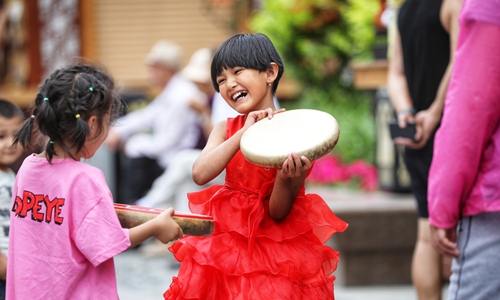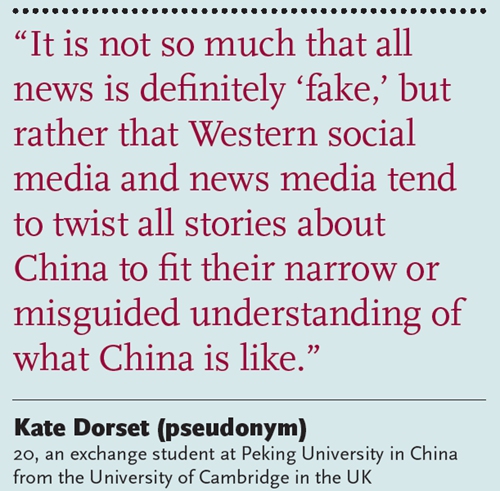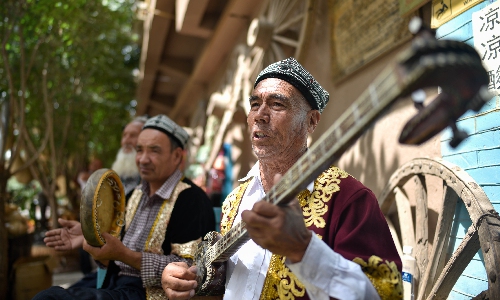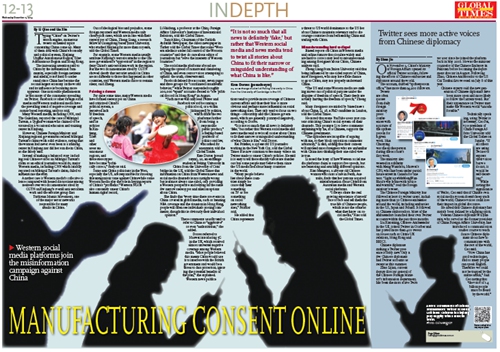HOME >> CHINA
Western social media platforms join the misinformation campaign against China
By Li Qiao and Liu Xin Source:Global Times Published: 2019/12/10 19:13:40

Children in Xinjiang play happily with a muscial drum. Photo: Cui Meng/GT
Typing "China" on Twitter's search engine, numerous tweets on heated topics concerning China come up. Many of them deal with China's economy and political system, Xinjiang Uyghur Autonomous Region, Tibet Autonomous Region and Hong Kong.The increasing attention paid to China by the international community, especially foreign netizens and media, is not hard to understand since China has become the second-largest economy in the world and its influence is becoming more apparent. One noticeable phenomenon is that many of the comments spreading on Twitter, Facebook or other foreign social media and Western traditional media have the prevailing trend of negative coverage and rumor-based reporting, analysts said.
Many Western media, including CNN, and The Guardian, reported the case of Mihrigul Tursun, a Uyghur woman who claimed to be tortured in a vocational education and training center in Xinjiang.
However, Chinese Foreign Ministry and Xinjiang regional government refuted Mihrigul Tursun's claims with solid evidence, saying that the woman had never even been to a training center in Xinjiang nor did her son die in China, as she falsely said.
Instead of making a balanced story including real Chinese voices on Mihrigul Tursun's claim as an ethical journalist would do, major Western media, including CNN which initially reported on Mihrigul Tursun's claim, failed to authenticate the story.
Another case is Western media's collective silence compared with heated discussions among netizens over two documentaries aired by CGTN on Xinjiang's overall anti-terrorism work and the terrorist group East Turkistan Islamic Movement, one of the major terror networks responsible for many attacks in China.
Out of ideological bias and prejudice, some foreign reporters and Western media only cherry-pick cases, which are in line with their stereotypes of China, Zheng Liang, a research fellow at Guangdong-based Jinan University, who studied Xinjiang for more than 10 years, told the Global Times.
For example, some Western media usually attribute Xinjiang's terrorist attacks to the Chinese government's "oppression" in the region to deny China's anti-terrorism work in the region. But the two documentaries aired by CGTN showed clearly that terrorist attacks in China are no different to those that happened in other countries, and Western media chose to remain silent, said Zheng.

Painting a demon
For quite some time, major Western media have formed stereotypes on China and criticized China's political system, a perceived lack of freedom of speech, and its policies in Xinjiang, Tibet and other areas autonomous regions, and these stereotypes have become "politically correct," analysts said.
Some anti-China politicians in the West, especially the US, are responsible for fostering this antagonistic tone against China while some Western media play the role in hyping reports of China's "problems." Western NGOs also constantly smear China's human rights record, Li Haidong, a professor at the China Foreign Affairs University's Institute of International Relations, told the Global Times.
Tunc Akkoç, Chairman of the Turkish Aydınlık Newspaper, the oldest newspaper in Turkey told the Global Times that some "Western media is under full control of the Western countries" and they do care about ethics of journalism but "serve the interests of Western countries."
The social media platforms abroad are helping the spread of rumors and slandering of China, and even censor voices attempting to uphold the truth, observers said.
Facebook deleted five accounts, seven pages and three groups for "coordinated inauthentic behavior," while Twitter suspended roughly 200,000 "spam" accounts created to "sow political discord in Hong Kong" in August.
"Such moves will only lead Twitter and Facebook toward becoming a political tool, or a victim [kidnapped] by politics, which drifts the two platforms further from being a responsible public product," a Beijing-based professor of politics and law, who asked for anonymity, told the Global Times.

Artists play music in the ancient city of Kashgar, northwest China's Xinjiang Uygur Autonomous Region, June 12, 2019. (Xinhua/Zhao Ge)
Kate Dorset (pseudonym), 20, an exchange student at Peking University in China from the University of Cambridge in the UK, told the Global Times that information on China from Western news and social media channels is not outright wrong but is almost always one-sided, only providing a Western perspective and relying on the same few narrow stereotypes and misconceptions about China.
She finds that "every time there are events in China covered in global media, such as banning NBA coverage and the situation in Hong Kong, people will often see individuals posting comments, though this is obviously their individual opinion."
These comments usually tend to refer to China as "aggressive" or even "authoritarian," she added.
Dorset referred to Huawei introducing 5G in the UK, which received almost universal negative coverage among Western media. "Most people believed this meant China would use it to interfere with the British government and would be a threat to data protection, ignoring the potential benefits of the plan," she explained.
Western news publications tend to provide more coverage of Chinese current affairs and thus their bias is more obvious and perhaps more influential on social networking sites. They only tend to focus on two things - censorship and the Chinese government, which are generally portrayed negatively, according to Dorset.
"It is not so much that all news is definitely 'fake,' but rather that Western social media and news media tend to twist all stories about China to fit their narrow or misguided understanding of what China is like," said Dorset.
Kei Pritsker, a 23-year-old US journalist working in the New York City, told the Global Times it is now common to see many videos on Twitter made to smear China's policies. He said it is easy to tell these shoddy videos are slanderous but some people may believe them since the US media lied about many countries in the world.
"Many people believe lies about these countries simply because they hear something on TV or see something on social networking sites," Pritsker said.
He added that China represents a threat to US world dominance so the US lies about China to maintain relevancy and to discourage countries from befriending China and trading with China.

People dance to music during Corban Festival celebrations in Kashgar, northwest China's Xinjiang Uygur Autonomous Region, Aug. 11, 2019. (Xinhua/Wang Fei)
Misunderstanding hard to dispel
Biased reports on China in Western media and online rumors that circulate widely and are hard to correct may lead to misunderstanding among foreigners about China, Chinese analysts said.
Zheng Liang from Jinian University said that being influenced by one-sided reports of China, most foreigners, who may have little chance to go to China, may not properly understand China.
"The US and some Western media are making moves out of political purpose under the disguise of freedom of speech. Their deeds are actually hurting the freedom of speech," Zheng said.
Many foreigners are misled by biased news about China, Li, 28, a PhD candidate in London, told the Global Times.
He noted that some YouTube users post content criticizing China's social system on their channels. This prompts Li to leave comments explaining why he, as a Chinese, supports the Chinese government.
"The uploaders are incapable of arguing with me, so they block opposition comments arbitrarily," Li said, adding that their content will mislead most foreigners who are unfamiliar with China into thinking their one-sided view is true.
Li noted the irony of how Western social media platforms claim to support free speech, but are censoring and attacking different opinions.
Xiao Mengyao, a 28-year-old Chinese woman who runs a café in Perth, Australia, finds that her patrons acquired misinformation about China from Australian media and Western social platforms.
"I always share the real growing experience of myself face to face and tell them the true life of Chinese people, which is not the same as what they know on social media," Xiao told the Global Times.

Newspaper headline: Manufacturing Consent Online
Posted in: IN-DEPTH